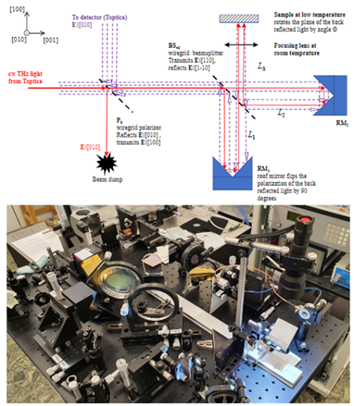
Fig. 1: Top: Schematics of proposed sub-THz Martin-Puplett scanning interferometer for MOKE spectroscopy. Bottom: Prototype test bench in development.
Invention Summary:
Quantum magnetism effects are extensively sought for in contemporary materials research. Recent studies of magneto-optical polar Kerr effect (MOKE), in which rotation of polarization is detected with high precision for beam reflected from surface of a quantum material, have emerged as key experimental probe to identify time-reversal-symmetry-breaking. Gaining the insights to the underlying mechanisms leading to the novel properties requires precise MOKE spectroscopy at sub-THz frequencies, which is extremely challenging with only limited toolset available.
Rutgers researchers have developed a novel magneto-optical polar Kerr effect spectrometer with unprecedented sub-mrad angular accuracy at sub-THz frequencies and high spectral resolution (Fig. 1).
Market Applications:
- Spectroscopy of quantum materials
- Spectroscopy of chiral superconductors and anomalous Hall effect materials
- Spontaneously induced magnetic moments in quantum materials including quantum magnets and unconventional superconductors
Advantages:
- Unprecedented accuracy in complex Kerr angle measurements as a function of frequency in the sub-THz range
Intellectual Property & Development Status: Provisional patent application filed, patent pending. Available for licensing and/or research collaboration. For any business development and other collaborative partnerships contact marketingbd@research.rutgers.edu.
Publications: